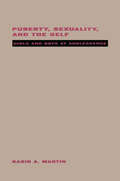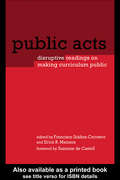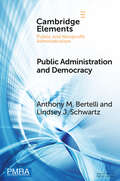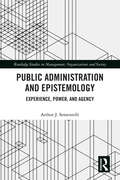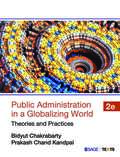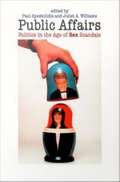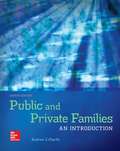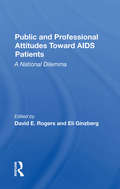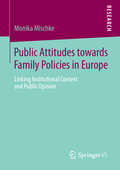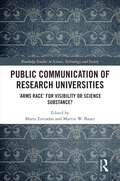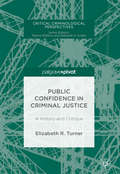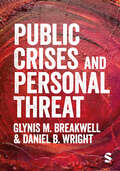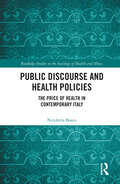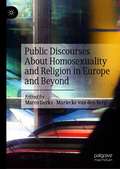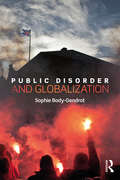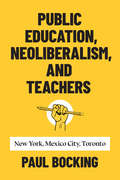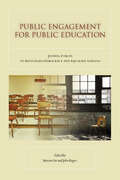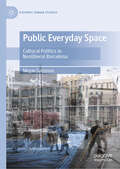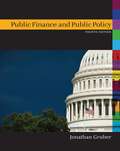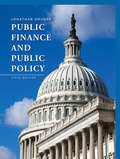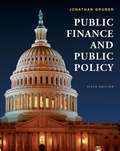- Table View
- List View
Puberty, Sexuality and the Self: Girls and Boys at Adolescence
by Karin MartinPuberty, Sexuality and the Self considers the effects of puberty and teenage sexuality on adolescents. By analyzing interviews with 55 teenagers, Karin Martin finds that girls' self-esteem drops significantly more than boys' does at adolescence. While this finding is supported by previous studies, Martin picks up where these earlier studies leave off by focusing on girls' development and considering different experiences of puberty and sex as an explanation for girls' greater drop in self-esteem. Puberty, Sexuality and the Self examines voice change, breast development, shaving, expectations of sex, the decision to have sex, experiences of sex and how boys and girls manage their emotions and selves throughout all of these new experiences. Comparing boys and girls at adolescence, Martin takes a qualitative look at puberty and sexuality, supporting her theory in the words of the adolescents themselves.
Public & Private Families Intro
by Andrew CherlinPublic and Private Families: An Introduction discusses the meaning of family, how it has evolved and continues to evolve, from both a private and public perspective. Andrew Cherlin guides students through an exploration of the history of families around the world in a way that prompts critical and sociological thinking. Public and Private Families: An Introduction defines the private family as our personal space, where we live most of our personal lives. Contrastingly, the public family is where we deal with broader societal issues and challenges. Cherlin invites students to take a close look at and assessment of gender, race, ethnicity and social class. Students are simultaneously prompted to explore the impact society, the workplace and public policy have on the family and family structures. The ninth edition of Public and Private Families: An Introduction includes expanded research and discussion on LGBTQ family life, and it also includes a new section on online matchmaking and commitment.
Public Acts: Disruptive Readings on Making Curriculum Public
by Erica R. Meiners Francisco Ibáñez-CarrascoAs this book documents local, specific, and contextualized acts of resistance and offers a detailed analysis of varied forms of public literacies, it functions as a template to inform and inspire resistant practices in diverse communities.
Public Administration and Democracy: The Complementarity Principle (Elements in Public and Nonprofit Administration)
by Anthony M. Bertelli Lindsey J. SchwartzThis Element argues for a complementarity principle – governance values should complement political values – as a guide for designing the structures and procedures of public administration. It argues that the value-congruity inherent in the complementarity principle is indispensable to administrative responsibility. It identifies several core democratic values and critically assesses systems of collaborative governance, representative bureaucracy, and participatory policymaking in light of those values. It shows that the complementarity principle, applied to these different designs, facilitates administrative responsibility by making the structures themselves more consistent with democratic principles without compromising their aims. This title is also available as Open Access on Cambridge Core.
Public Administration and Epistemology: Experience, Power and Agency (Routledge Studies in Management, Organizations and Society)
by Arthur J SementelliKnowledge does not happen in a vacuum, yet scholars and other professionals tend to engage in management scholarship focused on their specific niche often without knowing if or how their work might relate to other research streams. Further exacerbating things, people within specific disciplines, including management, tend not to communicate regularly outside of their relatively homogeneous audiences. If we were able to bridge communication among these groups, scholars, and practitioners, we might be able to better understand one another in a way that is contextually informed by each other’s experiences. Sementelli argues that understanding concepts of power, agency, and experience can provide such tools to orient management theories and practices relative to one another. Using critical management thought to frame a discussion of ontology and how knowledge emerges from it enables the development of an orienting "sandbox" that works both practically and intellectually. Such a "sandbox" enables us not just to communicate one’s organizational priorities but also reveal some underlying reasons for those priorities and areas of inquiry. This monograph focuses on public administration in particular as a special case of critical management research. This book also examines the complexity of experiences (of being) using Karl Jaspers as a basis. The sandbox that emerges can be used as a way to organize and orient management thought, especially in the public sector. It contributes both to administrative thought and applied inquiry into philosophy and will be of interest to researchers, academics, and students in the fields of critical management studies, organizational studies, and public administration.
Public Administration in a Globalizing World: Theories and Practices
by Bidyut Chakrabarty Prakash Chand KandpalThe book is recommended for undergraduate and postgraduate students of Political Science; Public Administration. Revised and updated extensively, this textbook captures the recent and relevant issues that students need to learn to grasp the dialectical interconnection between theoretical conceptualizations and prevalent socio-economic and political circumstances in the context of a transforming world. It examines all the major public policies on environment, health, education and employment, and incorporates the major changes that have taken place in a globalizing world. An essential reading for undergraduate and postgraduate students of public administration and political science, this book will also be useful for students appearing in various Indian civil service examinations and those aiming to clear the UGC-NET exam. Key Features: • Three new chapters added to address the changed milieu and the major issues and debates in public administration • Traces the journey of planning in India from Planning Commission to the National Institute for Transforming India (NITI) Aayog • Includes charts, diagrams, information boxes and tables to illustrate complex issues to the students
Public Affairs: Politics in the Age of Sex Scandals
by Paul Apostolidis Juliet A. WilliamsPublic affairs--or sex scandals--involving prominent politicians are as revealing of American culture as they are of individual peccadillos. Implicated in their unfolding are a broad range of institutions, trends, questions, and struggles, including political parties, Hollywood, the Christian right, new communications technologies, the restructuring of corporate media, feminist and civil rights debates, and the meaning of public life in the "society of the spectacle. " The contributors to Public Affairs examine, from a variety of perspectives, how political sex scandals take shape, gain momentum, and alter the U. S. political and cultural landscape. The essays in Public Affairs reflect on a number of sex scandals while emphasizing the Clinton/Lewinsky affair, certainly the most avidly followed and momentous sex scandal in American political history. Leading scholars situate contemporary public affairs in the context not only of earlier sex scandals in American politics (such as Thomas Jefferson's and Sally Hemings's affair), but also of more purely political scandals (including Teapot Dome and Watergate) and sex scandals centered around public figures other than politicians (such as the actor Hugh Grant and the minister Jimmy Swaggart). Some essays consider the Clinton affair in light of feminist and anti-racist politics, while others discuss the dynamics of scandals as major media events. By charting a critical path through the muck of scandal rather than around it, Public Affairs illuminates why sex scandals have become such a prominent feature of American public life. Contributors. Paul Apostolidis, Jodi Dean, Joshua Gamson, Theodore J. Lowi, Joshua D. Rothman, George Shulman, Anna Marie Smith, Jeremy Varon, Juliet A. Williams
Public And Private Families: An Introduction
by Andrew J. CherlinNationally recognized for its sound scholarship and balanced approach and written by one of the leading authorities in the field, this text examines the family through two lenses: the familiar private family in which we live most of our personal lives, and the public family in which we, as adults, deal with broader societal issues such as the care of the elderly, the increase in divorce, and childbearing outside of marriage. The book looks at intimate personal concerns, such as whether to marry, as well as societal concerns, such as governmental policies that affect families. Distinctive chapters – Chapter 9, “Children and Parents;” Chapter 10, “The Elderly and Their Families;” and Chapter 14, “The Family, the State and Social Policy” – examine issues of great current interest, such as income assistance to poor families, the effects of out-of-home childcare, and the costs of the Social Security and Medicare programs.
Public And Professional Attitudes Toward Aids Patients: A National Dilemma
by Eli Ginzberg David E. RogersThis volume analyzes in considerable depth how fears, prejudices, social and moral values, and individual perceptions have affected and shaped the public, the personal, the professional, and the economic ways in which our society interacts with people suffering from HIV infections.
Public Attitudes towards Family Policies in Europe
by Monika MischkeFamily-policy variation in Europe is still enormous and there is very limited knowledge about the publics' attitudes toward family-policy measures in a comparative perspective. This book addresses this research gap by combing a profound analysis of existing family-policy measures with a thorough analysis of public attitudes. Based on institutional theory, which argues that institutions structure the processes of orientation, the empirical analyses shed light on the relationship between the current family-policy setup, the social context, and public attitudes toward particular family-policy measures in 12 countries of the European Union. The results demonstrate that the social context needs to be taken into account in order to improve our understanding of attitudinal variation among different countries and family-policy contexts. Moreover, this book points out that only few patterns of social polarization are quasi universal whereas many others are specific to individual countries or certain groups of countries.
Public Choice III
by Dennis C. MuellerThis book represents a considerable revision and expansion of Public Choice II (1989). Six new chapters have been added, and several chapters from the previous edition have been extensively revised. The discussion of empirical work in public choice has been greatly expanded. As in the previous editions, all of the major topics of public choice are covered. These include: why the state exists, voting rules, federalism, the theory of clubs, two-party and multiparty electoral systems, rent seeking, bureaucracy, interest groups, dictatorship, the size of government, voter participation, and political business cycles. Normative issues in public choice are also examined including a normative analysis of the simple majority rule, Bergson-Samuelson social welfare functions, the Arrow and Sen impossibility theorems, Rawls's social contract theory and the constitutional political economy of Buchanan and Tullock.
Public Communication of Research Universities: ‘Arms Race’ for Visibility or Science Substance? (Routledge Studies in Science, Technology and Society)
by Marta EntradasThis book analyses communication of university research institutes, with a focus on science communication. Advancing the ‘decentralisation hypothesis’, it asserts that communication structures are increasingly built also at ‘subordinate unit’ levels of research universities. The book presents a cross-country systematic comparison of institutes’ communication activities showing ongoing transformations in their communication capabilities and practices. It considers a potential ‘arms race’ in activities, professionalisation, motivations, and evaluation. Based on empirical evidence from an international study carried out in various countries across Europe, the Americas, and Asia, the book examines the possibilities for civic science communication in this new context. It will be of interest to scholars and students of Communication Studies, STS, and Science Communication as well as to those taking or leading courses in the fields of Sociology, Public Relations, Marketing, Environmental and Risk Communication, Innovation Studies, and Social Psychology. It is an essential resource for funders, practitioners, teachers, and students dealing with science communication and the position of science in society.
Public Confidence in Criminal Justice
by Elizabeth R. TurnerIn this book, Liz Turner argues that survey methods have gained an unwarranted and unhealthy level of dominance when it comes to understanding how the public views the criminal justice system. The focus on measuring public confidence in criminal justice by researchers, politicians and criminal justice agencies has tended to prioritise the production of quantitative representations of general opinions, at the expense of more specific, qualitative or deliberative approaches. This has occurred not due to any inherent methodological superiority of survey-based approaches, but due to the congruence of the survey-based, general measure of opinion with the prevailing neoliberal political tendency to engage with citizens as consumers. By identifying the historical conditions on which contemporary knowledge claims rest, and tracing the political power struggles out of which sprang the idea of public confidence in criminal justice as a real and measurable object, Turner shows that things could be otherwise. She also draws attention to the ways in which survey researchers have asserted their dominance over other approaches, suppressing convincing claims by advocates of deliberative methods that a better politics of crime and justice is possible. Ultimately, Turner concludes, researchers need to be more upfront about their political objectives, and more alert to the political responsibilities that go along with the making of knowledge claims. Providing a provocative critique of the dominant approaches to measuring public confidence, this timely study will be of special interest to scholars of the criminal justice system, research methods, and British politics.
Public Crises and Personal Threat
by Glynis M. Breakwell Daniel B. WrightWith an emphasis on the practical, this book explains how people react to different sorts of crises, whether they be economic, environmental, health or war, and how we can better support the public, our families, and ourselves in future crises. The book interrogates how public crises are individualised, thought about, emotionally felt, and also mistrusted, all with a view to helping us understand some of the most difficult times we endure. Ideal for applied psychology students, public planning authorities and those specialising in crisis management this book will help us all to better understand the time we live in. Dame Glynis M. Breakwell is Professor Emeritus at the University of Bath in the Department of Psychology and has Visiting Professorships at Imperial College, London and the University of Surrey. Daniel B. Wright is Professor of Educational Assessment, in the Department of Educational Psychology and Higher Education, University of Nevada, Las Vegas.
Public Crises and Personal Threat
by Glynis M. Breakwell Daniel B. WrightWith an emphasis on the practical, this book explains how people react to different sorts of crises, whether they be economic, environmental, health or war, and how we can better support the public, our families, and ourselves in future crises. The book interrogates how public crises are individualised, thought about, emotionally felt, and also mistrusted, all with a view to helping us understand some of the most difficult times we endure. Ideal for applied psychology students, public planning authorities and those specialising in crisis management this book will help us all to better understand the time we live in. Dame Glynis M. Breakwell is Professor Emeritus at the University of Bath in the Department of Psychology and has Visiting Professorships at Imperial College, London and the University of Surrey. Daniel B. Wright is Professor of Educational Assessment, in the Department of Educational Psychology and Higher Education, University of Nevada, Las Vegas.
Public Discourse and Health Policies: The Price of Health in Contemporary Italy
by Nicoletta BoscoThe questions addressed in the book revolve around the public nature of health as an asset and the rights associated with it, by drawing attention to sociology’s role in shedding light on current dynamics and understanding how they may change in the future. In the field of public health, significant empirical evidence points not only to the outcomes, clinical and otherwise, that extensive information can produce but also to the urgent need to rethink the far from straightforward relationship between having this information and the ability to put it to effective use in tackling the problems it relates to. The book is intended for a broad audience of university researchers and students, particularly those involved in upper-level sociology and social policy programs. It will also be of interest to healthcare and social work policy-makers and practitioners who wish to gain a more detailed grasp of the dynamics of healthcare in order to approach its processes critically and improve their outcomes.
Public Discourses About Homosexuality and Religion in Europe and Beyond
by Marco Derks Mariecke van den BergThis volume addresses three things many people do not discuss candidly with strangers or mere acquaintances: God, sex, and politics. These can easily become topics of fierce debate, particularly when taken together, as has been the case with same-sex marriage legislation, the Vatican’s criticism of “gender ideology,” or the repeatedly asserted claim that Islam, homosexuality, and gender equality are essentially incompatible. This volume investigates what is at stake in these constructions of religion and homosexuality in public discourses. Starting with the Netherlands as a special case study, it proceeds with contributions on other predominantly postsecular countries in central, northern, and southern Europe as well as several postcommunist and postcolonial countries “beyond Europe.” Combining contemporary and historical perspectives and approaches from both the humanities and the social sciences, the contributors explore how national and European identities are constructed and contested in debates on religion and homosexuality.Chapter 2 and Chapter 8 of this book are available open access under a CC BY 4.0 license at link.springer.com.
Public Disorder and Globalization
by Sophie Body-GendrotThe current growth of incidents of public disorder around the world can be seen as symptomatic of major transformations in globalized society, government, and technology. But while disorder is routinely perceived as a disturbing phenomenon, it can also be a catalyst for positive transformation and regeneration. As social media is increasingly used as a platform for mobilization and organization, local disorder may spread outward through national borders, receiving international coverage and visibility as well as triggering a domino effect of global unrest. Combining qualitative and quantitative research, this ground-breaking text analyzes oppositional notions of order and disorder in global, national, and local contexts and considers the role of the police, the justice system, and other authorities in developing a range of responsive strategies. The author develops a new comprehensive framework for engaging in comparative and historical analysis of public disorder by drawing upon international case studies of public unrest such as 2005 in Paris and 2011 in London; the events in Ferguson and Baltimore that seeded Black Lives Matter; the Occupy movements in Zuccotti Park, Gezi Park, and Hong Kong; and the terror attacks in Paris and Brussels. This dynamic comparative study is informed by extensive international interviews and will be a required reading for students and scholars of criminology, sociology, political science, and urban studies.
Public Economics
by Gareth D. MylesThis textbook provides a thorough treatment of all the central topics in public economics. Aimed at senior undergraduate and graduate students, it will also be invaluable to professional economists and to those teaching in the field. The book is entirely self-contained, giving all the equilibrium theory and welfare economics needed to understand the analyses. The author covers the Arrow-Debreu economy, welfare economics and the measurement of inequality and poverty which lay the foundations and emphasise the important role played by information. Within the competitive economy, he examines commodity taxation, income taxation and tax reform in a certain environment. He goes on to study the public economics of uncertainty, and then treats public goods, externalities, imperfect competition and tax evasion as departures from the standard competitive assumptions and looks at their implication for public economics derived.
Public Education, Neoliberalism, and Teachers: New York, Mexico City, Toronto
by Paul BockingFrom pressure to "teach to the test" and the use of quantitative metrics to define education "quality," to the rise of "school choice" and the shift of principals from colleagues to managers, teachers in New York, Mexico City, and Toronto have experienced strikingly similar challenges to their professional autonomy. By visiting schools and meeting teachers, government officials, and union leaders, Paul Bocking identifies commonalities that are shaping how teachers’ work and public schools function. While arguing that neoliberal education policy is a dominant trend transcending the realities of school districts, states, or national governments, Bocking also demonstrates the importance of local context to explain variations in education governance, especially when understanding the role of resistance led by teachers’ unions.
Public Engagement for Public Education: Joining Forces to Revitalize Democracy and Equalize Schools
by John Rogers Marion OrrCommunity participation plays a large role in the success or failure of our public schools. This book focuses attention on the problem of inequality in public engagement, considering how race, class, ethnicity, language, and immigration status shape opportunities for engagement. Without the active participation of the public, chances for improving school systems are limited. Without equal opportunity for public engagement, those in the lower reaches of stratified society are left largely on the outside looking in-and that all too easily becomes a self-perpetuating cycle. Public Engagement for Public Educationspeaks to the potential for students, parents, community members, and civic leaders to join forces and create more equitable schooling. Such engagement can expand access to quality educational pathways which in turn paves the way to a stronger voice in society and the promise of the American dream. If segments of society are blocked access to those pathways, the book argues, nothing less than the health of American democracy is at stake.
Public Everyday Space: Cultural Politics in Neoliberal Barcelona (Hispanic Urban Studies)
by Megan SaltzmanThis book explores how everyday practices in public space (sitting, playing, walking, etc.) challenge the increase of top-down control in the global city. Public Everyday Space focuses on post-Olympic Barcelona—a time of unprecedented levels of gentrification, branding, mass tourism, and immigration. Drawing from examples observed in public spaces (streets, plazas, sidewalks, and empty lots), as well as in cultural representation (film, photography, literature), this book exposes the quiet agency of those excluded from urban decision-making but who nonetheless find ways to carve out spatial autonomy for themselves. Absent from the map or postcard, the quicksilver spatial phenomena documented in this book can make us rethink our definitions of culture, politics, inclusion, legality, architecture, urban planning, and public space.
Public Finance And Public Policy 4th Ed
by Jonathan GruberJonathan Gruber's groundbreaking Public Finance and Public Policy was the first textbook to truly reflect the way public policy is created, implement, and researched. Like no other text available, it integrated real-world empirical work and coverage of transfer programs and social insurance into the traditional topics of public finance. From its first edition, the book quickly became the market-leading text for Public Finance and Public Policy courses, and the margin is growing. Thoroughly updated, this timely new edition gives students the basic tools they need to understand the driving issues of public policy today, including healthcare, education, global climate change, entitlements, and more.
Public Finance and Public Policy
by Jonathan GruberJonathan Gruber's market-leading Public Finance and Public Policy was the first textbook to truly reflect the way public policy is created, implemented, and researched. Like no other text available, it integrated real-world empirical work and coverage of transfer programs and social insurance into the traditional topics of public finance. By augmenting the traditional approach of public finance texts with a true integration of theory, application, and evidence, Public Finance and Public Policy engages students like no other public finance text. Thoroughly updated, this timely new edition gives students the basic tools they need to understand the driving issues of public policy today, including healthcare, education, global climate change, entitlements, and more.
Public Finance and Public Policy
by Jonathan GruberWe are currently engaged in the most fundamental debate about the role of government in decades, and who better than Jonathan Gruber to guide students through the particulars in the new edition of his best-selling text, Public Finance and Public Policy, 6e. The new edition details ongoing policy debates, with special focus on the largest tax reform in 30 years. New topics include universal basic income, the legalization of pot, and congestion pricing. And, of course, there is an extensive, in-depth discussion of the debate over health care. At the heart of this new edition is the author's belief that at no other time has it been so important to know the facts, to distinguish facts from falsehoods, and to be thinking clearly about problem, policy, and politics. The sixth edition delivers on all counts.
